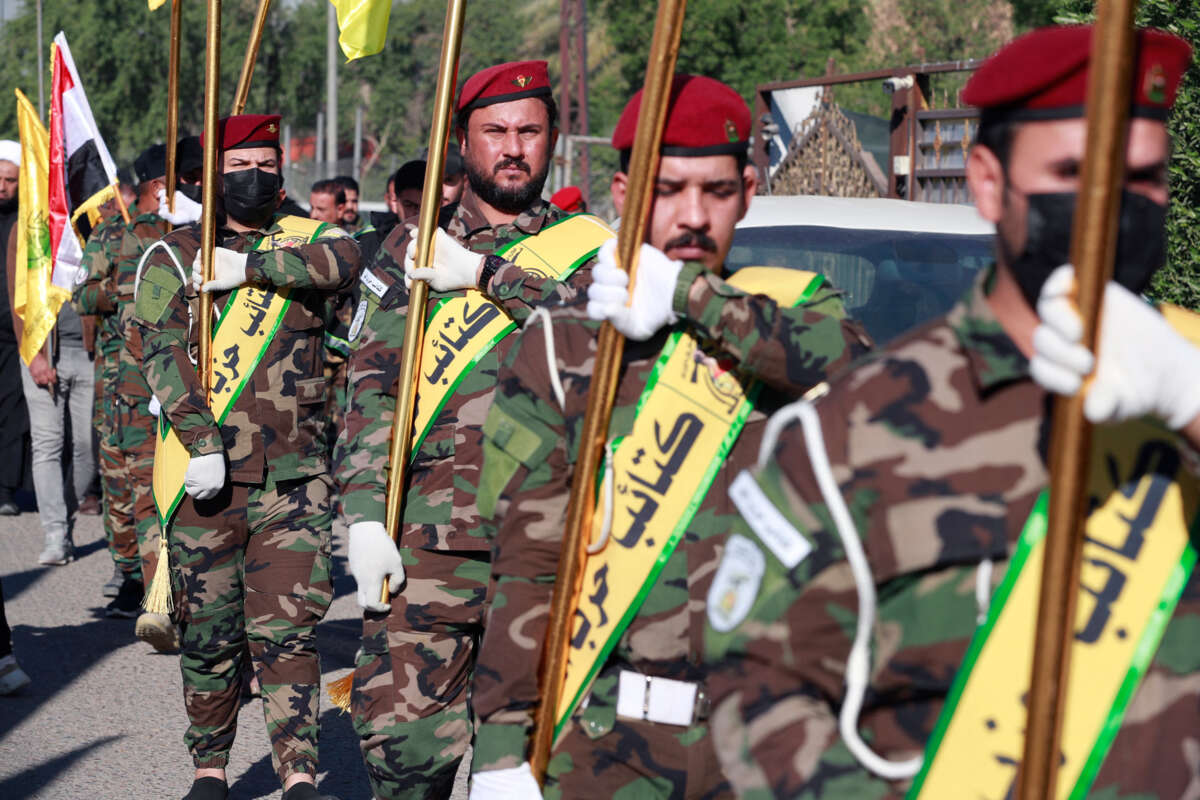A militia group that the Biden administration blamed for the deadly attack on U.S. forces stationed at a shadowy base in Jordan said Tuesday that it would stop targeting American troops in Iraq, a move that could clear the way for the withdrawal of U.S. soldiers more than two decades after the 2003 invasion.
“We announce the suspension of military and security operations against the occupation forces — in order to prevent embarrassment to the Iraqi government,” Abu Hussein al-Hamidawi, the leader of Kata’ib Hezbollah, said in a statement. “Our brothers in the Axis, especially in the Islamic Republic of Iran, they do not know how we conduct our Jihad, and they often object to the pressure and escalation against the American occupation forces in Iraq and Syria.”
Pentagon officials have specifically named Kata’ib Hezbollah as one of the groups behind the drone attack on U.S. troops in Jordan over the weekend. U.S. President Joe Biden and administration officials have said they ultimately hold Iran responsible for the attack, accusing that country’s government of funding and arming Kata’ib Hezbollah and other militia groups in the region.
Kata’ib Hezbollah’s leader said in his statement that the group has launched attacks on U.S. forces at its “own will, and without any interference from others.” Biden administration officials have admitted they have no evidence that Iran directed the Jordan attack.
Biden told reporters on Tuesday that he has decided how to respond to the Jordan attack but declined to provide any details.
Asked during a media briefing about Kata’ib Hezbollah’s statement, Pentagon Press Secretary Maj. Gen. Pat Ryder said he doesn’t “have a specific comment to provide, other than actions speak louder than words.”
The drone attack on American forces in Jordan came a day after the U.S. and high-ranking Iraqi officials held their first round of formal talks on the process of removing the roughly 2,500 U.S. troops still deployed in the country.
Analysts have argued that the continued presence of U.S. troops in Iraq and Syria has dramatically increased the likelihood of a broader regional war. The Intercept’s Ken Klippenstein reported Tuesday that U.S. military personnel in Iraq received a memo this month instructing them to be “on standby to forward deploy to support troops in the case of on-ground U.S. involvement in the Israel-Hamas war.”
Hisham al-Rikabi, an adviser to Iraqi Prime Minister Mohammed Shia al-Sudani, told CNN on Tuesday that Kata’ib Hezbollah’s vow to suspend its attacks on U.S. forces “is the result of efforts made by” Iraq’s government to “ensure the smoothness of the negotiation process and in order to complete the withdrawal [of U.S. troops] from Iraq.”
The New York Times reported Tuesday that Kata’ib Hezbollah had previously ignored the Iraqi government’s requests to stop attacking U.S. forces, “but once the attack in Jordan on Sunday took American lives, Mr. Sudani demanded a complete halt from Kata’ib Hezbollah.”
“Mr. Sudani reached out directly to Iran, according to a military strategist for the Revolutionary Guards who works closely with the Axis groups in Iraq,” the Times added.
Erik Sperling, executive director of Just Foreign Policy, said in response to al-Rikabi’s comments that, “if true, this is the least bad outcome.”
“Iraqi militias agree to stop targeting thousands of U.S. troops, who then can be safely removed from harm’s way, more than two decades after the disastrous Iraq war,” Sperling wrote on social media. “Hope we’ll see U.S. troops in Syria brought home too.”
Domestic and regional pressure on the U.S. to withdraw its forces from Iraq has grown since Israel began its latest assault on the Gaza Strip in October following a deadly Hamas-led attack. Militia groups, including Kata’ib Hezbollah, have launched upwards of 160 attacks on American troops in Iraq and Syria since October 7, and the Biden administration has retaliated with airstrikes in both countries — infuriating the Iraqi government and fueling concerns about a full-scale regional war.
The Jordan attack took those concerns to new levels as warhawks in the U.S. Congress demanded that Biden retaliate with strikes inside Iran. Progressive lawmakers, for their part, have called for an immediate cease-fire in the Gaza Strip, warning that further military action would only exacerbate the regional crisis.
Amir Saeid Iravani, Iran’s ambassador to the United Nations, said Tuesday that “if any party attacks Iran’s territory, or its interests or citizens abroad, it will be met with a decisive response.”
We have 7 days to raise $45,000 — we’re counting on your support!
For those who care about justice, liberation and even the very survival of our species, we must remember our power to take action.
We won’t pretend it’s the only thing you can or should do, but one small step is to pitch in to support Truthout — as one of the last remaining truly independent, nonprofit, reader-funded news platforms, your gift will help keep the facts flowing freely.
